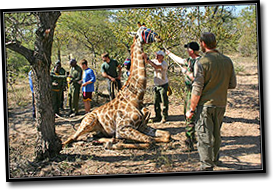 Life on the wild side - become a wild animal vet
Life on the wild side - become a wild animal vet
Wildlife veterinary medicine is the most challenging of all veterinary specialities; a dream job nowadays for many ecologically aware young people with a love for animals. Wild animal vets are required in zoos, conservation and breeding centres, protected wildlife reserves, animal sanctuaries and across a vast swathe of Africa in the many safari game parks and national parks, with the position a lifestyle commitment as well as a hugely satisfying, challenging, rewarding and occasionally very risky job.
Strong academic credentials including biological and ecological science-based degrees at Bachelor’s level are necessary for entry into most veterinary colleges in the USA, with UK universities also requiring high A-level passes in science and maths as a prerequisite for admittance to the six-year course. After gaining a basic veterinary degree, further study in the field of zoological veterinary medicine is required, with far fewer Western universities offering courses. However, for obvious reasons, the Australian and South African universities are more forthcoming and offer a higher level of training. Masters’ degrees are required for many of the advertised positions.

Basically, the day-to-day tasks of a wild animal vet are similar to those in conventional veterinary practices, involving treating injuries and disease and maintaining the health of the animals in their care. The patients, of course, are a different and far less cuddly story, especially those in national parks and protected reserves, requiring training and experience in handling as well as an upgraded sense of self-preservation! Working conditions can also be a challenge, ranging from modern medical facilities to emergency outwork in the wilderness along with lurking spectators either slithery or sporting four legs and large teeth.
Other tasks may include supervising breeding programmes involving endangered species, rehabilitating injured or orphaned animals and birds into their correct ecosystem and monitoring animal movements with implants in order to understand migration patterns. Working with specialists monitoring the ecosystems themselves for changes in climate patterns affecting indigenous species is another key component of the job, recently recognised as essential for the health of the species involved.
Entry-level salaries for wildlife veterinarians vary wildly dependent on the geographical location of the job itself, and often include accommodation in remote areas. In Western countries, salaries are low, considering the amount of training and qualifications requested, compared with good jobs in the regular veterinary sector. Negotiable salaries are offered along with other benefits in game parks, national parks and wildlife sanctuaries elsewhere on the planet, dependent again on the financial status of the organisation.

